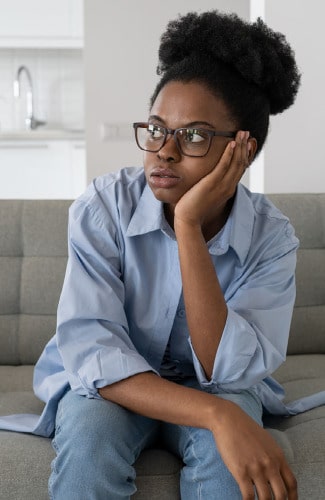How to Deal with Anxiety: Anxiety Therapist in California | Anxiety Treatment California

Anxiety Treatment Specialist
Anxiety Therapy Online in California
Everyone feels anxious from time to time. Anxiousness is a natural human emotion. It is a natural reaction to life stress. It's part of your body's natural alarm system. It can help you stay focused and alert in a charged or dangerous situation.
Feeling anxious is part of your fight-or-flight system. It helps you notice details and alerts you to the possibility of danger. It gives you the opportunity to assess your situation quickly and decide if you need to get to safety. Without anxious responses and the vigilance that comes with them, the human race would have died out long ago.
Today, some people still rely on a high level of vigilance to survive. They live in unstable conditions with food insecurity, lack of housing, violence, and other unmet basic human needs. Being alert and aware is necessary for survival. Anxious feelings can give you a rush of energy and help you focus on what you need to do in the moment to keep yourself safe.
How long anxiety lasts is part of the diagnostic criteria for an anxiety disorder. Anxious sensations become a problem when they become chronic and negatively impact your daily life. Anxious feelings can be persistent and debilitating. Perpetual anxiety can make you feel wound up, unsafe, and vulnerable. Debilitating thoughts with no purpose of maintaining safety can play over and over in your head with no time to rest or find peace. It can seem like your discomfort will continue forever.
If self help for anxiety is not getting the results you were hoping for, it could be time for some professional help. Anxiety therapy can help you create useful anxiety counseling goals, learn how to deal with your discomfort, work on establishing a serene environment, and get back to living life on your terms. It can help you structure you life differently so you feel more comfortable being yourself and can let your guard down. You can how to deal with worry so it doesn't take over your thoughts and cause you to miss out on enjoying the present moment.
You deserve to design the life you want without disturbing thoughts getting in your way. You can move your worry to the back of your mind so you can see situations differently and allow yourself to enjoy doing what you want to do with the people you care about.
Anxious feelings are one of the most common reasons for
seeking therapy.
Anxiety therapy online in
California, Nevada, and Florida can help.
The most common issues my clients bring up when they begin therapy are:
not being good enough
excessive worry
feeling worthless
constantly feeling overwhelmed
unable to control your emotions
academic or work performance is suffering
overly concerned about what others might think of them
want to stop using unhealthy coping mechanisms
having difficulty finding joy
fearful of being judged
worried people won't like them
no drive to do things you used to enjoy
relationships are suffering
unresolved trauma
feeling paralyzed
separation anxiety
difficulty with transitions
social situations
impacts the ability to work
health issues/ chronic illness
health/medical anxiety
concerns about returning to work
parenting
finances

They want to get rid of feelings of anxiety and anxious reactions, but as I said above, to a certain extent, they are necessary and good. Being anxiety-free would just create a different problem. It wouldn't make your life better.
Being anxious and amped up doesn't feel good, even when it's good for you and telling you to find a safe place. It is designed to make us uncomfortable. The point is to urge us to take action immediately. If you ignore it, it will be persistent. The more you dismiss it, the more it will grow. By now, you know that neglecting your anxious responses isn't working for you. It's time to do something different.
Self help for anxiety can be helpful, but if you are still experiencing issues that are impacting your ability to function at your best, ask for help. Online anxiety therapy can help you manage your emotions and develop anxiety relief techniques. Working with an anxiety therapist in California can help you figure out how to deal with anxiety in your own way.
How long anxiety lasts:
The impact of anxiousness on everyday life

Living with anxious feelings can range from mild to severe and have profound implications on your everyday life.
But how long anxiety lasts depends on several factors. Single cases of anxiousness based on stressful upcoming events are usually nothing to worry about and fade away when the event is over. Fear and worrying about something or someone is a natural human response. Anxious feelings that are short-lived and infrequent are not the same as having a severe case or a diagnosable disorder.
Significant changes in your thought process, emotions, reactions, or behaviors that cause distress and problems functioning can qualify you for a diagnosis. More severe symptoms like increased heart rate, shortness of breath, sweating, clammy hands, and persistent fear or worry could also be signs of a more serious issue. How long anxiety lasts is different if you qualify for an anxiety-disorder. You may go into a fight-or-flight state without much warning with a trigger.
Untreated, feelings of anxiety can become chronic and last for months or even years. Anxiety can become ingrained and become a way of life that seems to be your natural state. The effects of prolonged symptoms can be debilitating and make it difficult to focus at work or go about your daily life without fear. Anxiety may not go away and can get worse as time passes. The severity and whether or not you are able to manage your symptoms through therapy can help answer how long anxiety lasts.
Without treatment, symptoms can progress and become extremely debilitating. Early intervention can help. Changing your mindset and using different coping mechanisms can help you avoid extending your suffering. It can also help to make changes in your thought process and how you see the world.
You can disrupt your pattern of wondering how long anxiety lasts. Learning how to cope, adjust reactions, and create anxiety relief techniques to lessen your symptoms can help you get back to living your life more quickly when anxiety starts to take hold.
The effects of anxiety-related issues can be far-reaching and devastating. Trauma and anxiety often co-occur. You can find some relief with self help for anxiety. You can do simple things to reduce your anxious feelings if they are just beginning or mild.
Left untreated, anxiety can lead to depression and other mental health issues, decreased productivity at work and school, social isolation, financial problems, and even physical health issues such as heart disease.
The Anxiety and Depression Association of America (ADAA) reports that symptoms can include restlessness, fatigue, difficulty concentrating, irritability, sleep disturbances, and muscle tension. For many individuals who experience these symptoms regularly, seeking help from a qualified therapist or counselor can make all the difference in their quality of life.
Fortunately, help is available through various forms of therapy. Anxiety treatment in California gives you the opportunity to benefit from interventions proven to be effective and provide relief from the symptoms associated with this mental health disorder. Numerous licensed mental health professionals are available throughout California to provide professional counseling services for anxiety-related disorders. Online anxiety therapy is often more accessible than in-person sessions and makes it easier to fit therapy into your busy life.
Good things about anxious feelings
Anxiety-related disorders can be a debilitating, but there are some positive aspects. Anxious feelings help motivate you to set and achieve goals, rise to the occasion, get things done on time, or be more organized. They can help with problem-solving skills and encourage you to think through potential solutions more carefully before implementing them.
Feeling anxious can help you boost your performance in a new situation and give you that extra push you need to succeed. When a new challenge presents itself, feelings of anxiety step in to help you do your best.
Holding onto your benefits when you decide to address your distress is vital. You don't want to do away with the parts of anxiousness that work for you. Part of your anxiousness makes you capable of achieving your goals. With help from an experienced anxiety therapist in California, you can manage your symptoms, so they support you and don't interfere with daily life.
Anxiety therapy online in California provides Californians access to treatment without traveling long distances for appointments.

How to know when to get help for anxious feelings and consider anxiety counseling sessions:
Anxiety Treatment California
Anxiousness is a widespread and common emotion that everyone experiences from time to time. But, when it becomes excessive and begins to interfere with daily life, it can be cause for concern. You can try some self help for anxiety before things get out of control and make daily tasks challenging. Be aware of symptoms and notice if they are diminishing.
Anxiety-related issues can manifest as physical and mental symptoms and, if not appropriately addressed, can be very detrimental to overall health and well-being. If you are feeling overwhelmed and anxious in California, an anxiety treatment specialist may be able to help you identify signs if your level of anxiousness is becoming unhealthy.
Anxiety counseling sessions can help you with establishing a serene environment so you can get on track to become more productive. With online anxiety therapy, you can receive services wherever you have internet access. Anxiety treatment, California can help you start living the life you want.
Knowing when feeling anxious is helpful and supports you to rise to a challenge and when it's time for therapy can be challenging. If you're growing and learning while moving forward, building your life, and achieving your goals, your should expect some anxiety-related symptoms along the way.
When you push yourself to grow and take on new challenges, it's perfectly natural to experience some anxious moments. You're blazing new trails. It's exciting but a bit scary at the same time. One of the significant differences here is that you are creating your anxious reaction by moving yourself forward. It is an anxiousness you choose. It fits with your vision for your life and helps you grow into the best version of yourself.
Online anxiety therapy: When anxious feelings start interfering with your daily life, it is time to get help.
Some signs that your anxious feelings are unhealthy and holding you back are:
sleep problems
uncontrollable worrying
worry affects your daily life
worrying about even the smallest of things
constantly focusing on "what ifs"
having a sense of impending doom
difficulty concentrating on tasks and activities
avoiding situations or people out of fear or worry
feeling exhausted all the time with no explanation
general fatigue
panic attacks
irrational fears
eating more or less than usual
body aches and headaches
poor job performance
relationship issues
Signs and symptoms can manifest in many ways, from difficulty concentrating and sleeping to physical symptoms such as headaches or stomach pains. If you are struggling with anxiety-related symptoms and their effects on your life, help is available.
Anxiety therapists in California offer specialized treatment for managing anxious reactions and stress-related issues. You can gain access to treatment to reduce the severity of your symptoms. Together we can find solutions that fit with who you are and the specific symptoms you want to address. We can devise a customized plan tailored to your needs.
What is the difference between Anxiety and Stress?
Anxiety and stress are often used interchangeably and thought to mean the same thing. However, there is a crucial distinction between the two:
Anxiety includes a feeling of unease or apprehension about an uncertain outcome, while stress can stem from external pressures and inner turmoil. Anxiety has fear-inducing thoughts that can make you feel out of control for not being able to predict what will happen next.
They can both have physical and emotional symptoms. Increased heart rate and breathing problems are common physical symptoms.
Stress can be caused by outside sources like work or personal relationships, while anxiousness usually comes from excessive worry about the unknown or thoughts about what could happen.
Experiencing high levels of stress may lead to concentration problems. It can also make you more prone to mood swings. Feeling anxious tends to be more internal, with recurring thoughts of all the possible bad things that could happen.
Trauma and anxiety are often intertwined and require professional help to resolve.

Chronic anxiety can become an anxiety-related disorder.
Chronic anxiety is a sustained high level of anxiousness that lasts more than six months. It can become an anxiety-related disorder if left unchecked. To avoid developing a mental health disorder, seek help from a anxiety therapist in California. An anxiety treatment specialist can help you manage symptoms before they escalate.
As anxious feelings become more prevalent, you get closer to meeting the criteria of a formal diagnosis of an anxiety-related disorder. Your normal feelings of nervousness or anxiousness compound and become excessive. As symptoms worsen, you may begin to notice yourself avoiding situations that trigger or worsen your symptoms. Next, you find yourself isolating and cutting off social interactions.
In order to qualify for a diagnosis of an anxiety-related disorder, your fear or anxiousness must escalate to the point of being out of proportion with the situation, impact your ability to function normally, care for yourself, and meet your obligations.
There are several types of anxiety-related disorders:
Generalized Anxiety Disorder (GAD)
Social Anxiety Disorder
Panic Disorder
Specific Phobias
Agoraphobia
Separation Anxiety Disorder.
Trauma and anxiety often go hand in hand. If you have experienced trauma, you may experience anxiousiness, increased worries and possibly panic attacks. You may also avoid social situations that trigger your to trauma symptoms.
If left untreated, chronic anxiety can lead to disability. It can reduce your ability to work and cause loss of wages or, even worse, loss of employment ,and a high risk of suicide.
Anxiety counseling sessions conducted online with an experienced anxiety therapist in California are a convenient way to receive personalized treatment for anxiety-related symptoms before they becomes chronic. With the help of a professional counselor in California, you can make changes in your perception and thinking and develop coping skills that will help you manage your symptoms.
We will work to find solutions that are comfortable for you. Finding your personalized solutions can be more effective since they are easier to implement and they fit into your life more naturally. Establishing a serene environment is a common first step to creating a foundation for a calmer lifestyle.
It is possible to get control over your anxiousness and live your life without the constant, hypervigilant buzz of anxious thoughts running through your head day in and day out. You can figure out how to deal with anxiety so you can have more peace in your life.

Social Anxiety
One of the most common forms of anxiety-related symptoms takes place in social contexts. Social anxiety, or social phobia, can originate in the early years when a child is rejected or judged by caregivers, friends, or bullies. It is usually fear-based and consists of thoughts of judgment and conjuring up what others might think of you. Symptoms of trauma and anxiousness together can have social implications that may become isolating.
Dealing with social phobia can include working on relationships, thought patterns, self-esteem, self-worth, and self-image. Treatment revolves around the social aspects of life and how to feel comfortable in social situations. Healing from social phobia involves learning to be with others while maintaining a positive sense of self.
Panic Attacks
Panic attacks, or anxiety attacks, are common among those with anxiety-related disorders. Panic attacks are a common symptom made up of intense fear, worry, and dread. They can be debilitating, impair focus on daily life and keep you from participating in activities. Panic attacks are acute episodes where anxiousness intensifies and stops you from functioning.
Panic attacks are different than plain panic. Panic can be a healthy response to a dangerous situation that spurs you into action to stay safe. Panic attacks, on the other hand, don't help you. A panic attack can be paralyzing and does not generally correlate with the level of urgency. It is an exaggerated response that can often seem to come from nowhere.
Panic, trauma and anxiousness are common comorbidities. Handling panic attacks usually requires pre-planning. Designing personalized skills to prevent or reduce the impact of your attacks can make it easier to implement than thinking up a way to handle the situation on the spot when you are activated. As you continue to use pre-planning, you can start to address your panic earlier and implement your customized solution before things get out of control.
Working on self-esteem and believing in yourself can increase your confidence and reduce your worrying about what other might think about you. When you are more confident, you can take the opinions of others with a grain of salt.
Without addressing your anxiousness and panic attacks, they can devolve into a crippling anxiety-related disorder that will get in your way of living the life you want. If trauma is also present, it can complicate healing.

How long do anxiety attacks last?
Anxiety attacks can cause extreme physical and emotional distress, so understanding how long episodes last is important for managing them. They typically begin abruptly and can last for a few minutes, up to an hour, and sometimes longer.
During this time, you may experience a range of physiological symptoms like sweating, shaking or trembling, chest pain, dizziness, or lightheadedness. The intensity of the attack will vary depending on the skills you use to manage your panic and your underlying level of anxiousness.
Anxiety-related symptoms can feel overwhelming. Knowing that they will come to an end and not continue on forever can help you get through them. It is helpful to learn how to how to combat anxiety and reduce the intensity and duration of your attacks. Simple things like taking deep breaths, focusing on something soothing, using predetermined coping skills, or positive self-talk can be part of your strategy. Identifying triggers, such as certain situations or events that may cause strong emotions, can also help anticipate when an attack might occur and give you time to prepare for it in advance.
Working with an anxiety therapist in California can help you prepare for the next time you might face a panic attack and help you design a method unique to you to avoid or reduce a spike in your anxious reactions.
Trauma and Anxiety: How trauma causes anxiety
Trauma can have a profound effect on mental health. It can complicate treatment by adding several variables and symptoms that may overlap. Trauma reactions can include:
sadness
fear
numbness
confusion
agitation
hyperarousal
dissociation
physical symptoms
exhaustion
inability to recognize emotions
Anxiousness is one of the most common mental health issues after a traumatic experience. It can be overwhelming after trauma that stems from fear, discomfort, dread, panic, and worry. Trauma and anxiety-related symptoms often go hand in hand. Traumatic events can lead to intense emotions of fear and anger that can persist long after the event. These emotions become chronic and develop into persistent anxious feelings.
Unresolved trauma can cause changes in your brain that support anxious symptoms such as insomnia, irritability, racing thoughts, difficulty concentrating, increased stress levels, and physical tension. Trauma-related anxiousness may cause you to feel detached from your body or struggle with intrusive memories or nightmares about the traumatic event.
An anxiety therapist in California with training in trauma treatment can help you when your trauma-related symptoms are entwined with anxiety.


How to deal with anxiety
How to get help with anxiety
Excessive feelings of anxiousness can bring worry and dread into your daily life. It can cause difficulty breathing, your can start to race, your stomach to get tied into knots. You may feel paralyzed and powerless to stop it causing feelings of hopelessness.
Various factors, such as stress, poor nutrition, or a lack of quality sleep, can cause anxiousness. You can begin your journey into how to get help with anxiety by addressing these with your doctor. If anxious feelings have been interfering with your daily life for a while, it's possible you have an anxiety-related disorder. If that's the case, you could require professional treatment help you manage your symptoms.
Anxiety Tips
Fortunately, the question of how to get help with anxiety has multiple answers. Everyone has unique needs to consider.
Learning how to deal with anxiety can increase your quality of life. There are many ways to reduce symptoms and help you start to feel better. You may find relief through relaxation techniques like yoga or meditation, which can relieve both physical and mental symptoms.
Some people get relief from anxious feelings by establishing a serene environment and noticing their anxiousness as they relax into it. Others look at their reaction to a situation without emotion and ask questions about it's validity. This process can stop the continual loop of repeating thoughts that are torturous and cause distress.
Think about making some lifestyle changes. Move your body regularly, improving your sleep, and eating a balanced diet can help reduce your stress levels.
It can also help to address your mindset. If your anxious reactions show up as worrying about threats that may or may not happen in your future. You know it isn't a reality in the present and can work on changing your thought process.
Strategies on how to deal with anxiety also include working with a specialist who treats anxiety-related disorders.
While you can make changes that help reduce your symptoms, there are times when knowing what to do doesn't easily translate into taking action that works for you. Working with a therapist can give you clarity and insight into what's best for you.
Once you have decided on your anxiety counseling goals, you can get creative with your therapist to find solutions that work for you.

Anxiety relief techniques and establishing a serene environment
In today's world, stress is an inevitable companion. Finding effective ways to alleviate anxiety is more crucial than ever. You need a way to survive overwhelming worry and unease. Some techniques have been practiced since ancient times. Others are relatively new and based on scientific studies. Whether you need a moment of calm amidst chaos or want to attain long-term resilience as you experience life's ups and downs, many anxiety relief techniques are available to get you through tough times and help you reach a place of inner peace and emotional well-being.
The old tried-and-true anxiety remedies may be just what you need. The first thing that often comes to mind is deep breathing exercises. Many types range from simple in-and-out slow breathing to different patterns and timing of inhaling, holding, and exhaling. Taking simple, slow breaths can activate your body's relaxation response, help calm your central nervous system, and slow down your racing mind. In our fast-paced society, with stress levels at an all-time high, taking a moment to stop what you're doing and focus on something as simple as your breath can work wonders for easing anxiety. It is an easy anxiety relief technique that doesn't require any planning and can be done anywhere. You always have your breath with you.
Another classic technique is taking a time-out to move your body. Our bodies were built to move, and sitting still for long periods of time isn't natural. Any movement that is comfortable to you can make a difference. There is no time requirement or obligation to work hard enough to sweat. If standing up isn't something you can do in your situation, move anything you can. Even adjusting your eyes to look at something farther away is a type of movement. You don't have to get up and run a race. Accessibility is the key. For example, no additional equipment or special training is required for breathing. You're always good to go.
Many alternatives exist if the more classic relief solutions don't appeal to you. They include playlists, guided meditations, mindfulness techniques, endless apps, and more involved ways to manage stress and soothe your central nervous system. Managing anxiety can be very personal. You may require your own unique solution to finding peace. Anxiety relief techniques can be designed to fit your specifications and meet your personal needs. Anxiety therapy is a good place to take stock of your requirements and create a custom anxiety solution.
As you finish establishing a serene environment, imagine yourself fully prepared for the turbulence of anxious thoughts and daily stressors. Picture what it will be like to feel your tension dissipate as you initiate gentle self-care that brings relaxation. You have a plan to navigate daily complexities with purpose and ease despite pressures and expectations. By harnessing the power of simple anxiety relief techniques, you can navigate turbulent situations with grace. You can soothe yourself while you reclaim your sense of stability and resilience.

Anxiety Counseling Goals
Online anxiety treatment can help you learn to manage your anxiety-related symptoms and live a more balanced life.
An anxiety treatment specialist aims to help you develop skills, strategies, and resources to recognize and effectively manage your emotional responses.
We focus on identifying your underlying causes, developing coping mechanisms, improving communication skills, learning to calm yourself, and setting achievable goals.
We will work closely together to create a plan that incorporates both reducing and managing your anxious reactions so you can improve your quality of life.
Anxiety counseling goals include:
find and address the causes of your anxious reactions
recognize triggers and reduce their impact
reduce worry
reduce overarousal
calm obsessive thoughts
increase realistic thoughts
manage panic attacks
increase your ability to cope
avoid becoming incapacitated
increase social contact
calm your mind
overcome your fears
increase self-esteem
develop problem-solving skills
change your thought process
trust your ability to manage your emotions
see things from multiple perspectives
tolerate mild to moderate symptoms
look forward to events without fearing a panic attack
become more comfortable with vulnerability
replace coping strategies that aren't working with those that work
create anxiety relief techniques
establishing a serene environment
Anxiety Treatment - California:
Online Treatment for Anxiety
You don't have to live with paralyzing fear, anxious feelings, and intrusive thoughts negativity affecting your day-to-day life. With the help of a qualified therapist, it is possible to reclaim control of your life and find relief from anxiety-related symptoms. You can address underlying issues contributing to your anxiousness and learn how to cope so you can live your life without limits.
Online treatment for anxiety has become popular in California. Not only does it save you driving time, but it also allows you to access the help you need from the comfort of your own home. With online therapy, you can receive quality care without leaving home or taking time off work.
Online anxiety treatment offers unique benefits that traditional face-to-face counseling does not provide. You can join anxiety counseling sessions anytime and anywhere, eliminating the need to find childcare or take time away from work during regular office hours. Online sessions make it easier to receive personal attention from an anxiety treatment specialist with training in anxiety-related disorders. You can search the entire state to find an anxiety specialist with availability.
When looking for anxiety treatment, California residents can choose a therapist that is located anywhere in the state. This can help you find a therapist who fits your needs.

Finding the Right Anxiety Therapist in California
If you are dealing with anxiety-related symptoms, you must know how to find the right anxiety treatment specialist. Working with a mental health professional can be an effective way to get the support you need in managing your symptoms. However, finding a therapist who understands your specific needs and provides quality care can feel overwhelming.
There are several ways to find the right anxiety treatment specialist for you. You can research therapists throughout the state and read profiles to provide insight into which therapists may be a good match for managing your concerns and reaching your anxiety counseling goals. Consider asking for referrals from friends, medical professionals, and therapists who are not currently taking new clients. They can connect you to providers you might not find through an internet search.
Anxiety therapy online in California can open up your search to a more comprehensive selection so you can find an anxiety treatment specialist you feel comfortable with so you can develop a productive therapeutic relationship. Research shows that the therapeutic relationship is the most important factor to successful therapy outcomes. It is important to feel a connection with your therapist and feel comfortable sharing your experiences, insights and ideas.
Online anxiety counseling sessions offer more flexibility, and many experienced providers offer quality treatment through HIPAA-compliant video conferencing platforms. Many clients prefer online sessions where they can choose a comfortable place to participate in therapy. Meeting virtually also provides an additional layer of privacy. There is no chance of seeing someone you know in a waiting room when you are joining from a remote location. It is common for pets to comfort them while they are working through sensitive experiences.
Anxiety therapy online in California is a great way to access quality mental health care with an anxiety treatment specialist from the safety and comfort of your own home. Online therapy gives you quick access to an experienced counselor who understands how to treat different forms of anxiety-related disorders, including panic attacks. With online anxiety counseling sessions, you don't have to deal with long waiting lists or travel costs associated with traditional counseling sessions. You can find a therapist who has immediate availability and get started right away.

Specialist for Anxiety and Depression: Online anxiety treatment
Anxiety and depression are two of the most common mental health issues. They often co-occur. Therefore, it is important to seek help from a specialist who is well-versed in treating both conditions.
A therapist who specializes in anxiety and depression can provide personalized treatment for your anxiety counseling goals. Together we will design your sessions specifically to meet your individual needs. You can learn how to manage your symptoms and lead a healthier life through therapy.
In your therapy sessions, we will focus on what you need to manage symptoms, calm your central nervous system, and cope with stressful situations. We will identify triggers for episodes and develop strategies for coping effectively. You can increase your self-awareness and take charge of your emotions. You can reduce stress and worry levels and decrease the ability of your conditions to run your life.
An online specialist for anxiety and depression provides a safe space for you to discuss struggles with anxiousness and depression without judgment or stigma. Participating in therapy can help you understand your thoughts and behaviors and make changes that affect your overall mental health.

How common are anxiety disorders in California?
Feeling anxious is a common mental health issue. It can show up in various ways and cause physical, emotional, and cognitive distress. Unfortunately, anxiousness is a growing problem in California. The majority of adults report having experienced at least one symptom of an anxiety-related disorder within the last year.
According to recent research, nearly 18% of California adults have been diagnosed with an anxiety-related disorder. About 29% reported feeling symptoms associated with panic disorder. More than half of adult Californians reported feeling extreme stress over the last year.
Los Angeles, one of the most populated cities in the United States, experiences a wide range of mental health issues. Anxiety-related symptoms are prevalent among Los Angeles residents. UCLA researchers found that over 40% of LA-area adults reported feeling anxious or worried every day – much higher than the national average of 15 percent.
Immigrants and people from racial/ethnic minority groups, and those living below the poverty line, are even more likely to suffer from anxious episodes compared to their white counterparts. They are also more likely to report higher worry and stress levels than those with higher incomes. Online anxiety therapy can help marginalized populations gain access to care.
Anxiety in Sacramento
Sacramento has also seen a significant rise in anxious thoughts and behaviors among its residents, with statistics showing that nearly one-in-five adults suffer from anxiety-related disorders. Statistics from the Sacramento Mental Health Board show that 18% of adults living in the Sacramento area struggle with Generalized Anxiety Disorder (GAD), Panic Disorder, Social Phobia, or Post Traumatic Stress Disorder (PTSD).
Anxiety in San Diego
According to statistics from San Diego County, anxiety-related symptoms affect approximately one out of every four adults in the San Diego area. The prevalence has created an increased demand for diagnosis, treatment, and therapy for those struggling with anxious thoughts and feelings.
Anxiety therapy online in California can help meet those needs by providing therapy from a distance. With anxiety treatment, California residents can get the help they need.

Anxiety in the San Francisco Bay Area
The Bay Area is known for its vibrant and diverse culture, but it's also becoming a hotspot for anxiety-related issues. Statistics show that mental health concerns are on the rise in the Bay Area. In recent years, residents of San Francisco, Oakland, San Mateo, Palo Alto, and other cities have increasingly sought treatment from therapists specializing in anxiety-related disorders.
Feeling anxious is a common problem throughout California and the Bay Area specifically. Recent studies indicate that there has been an increase in people seeking help for anxiety-related conditions. Research shows that 1 in 6 adults in San Francisco experiences high levels of stress or distress throughout any given year. These numbers are especially concerning compared to similar California state data. Several studies have found that the prevalence of anxiety-related disorders among San Jose residents is significantly higher than the national average.
If you've been asking yourself, "how common are anxiety disorders?" the answer is extremely common. It tends to be the most common mental health issue therapists treat.
